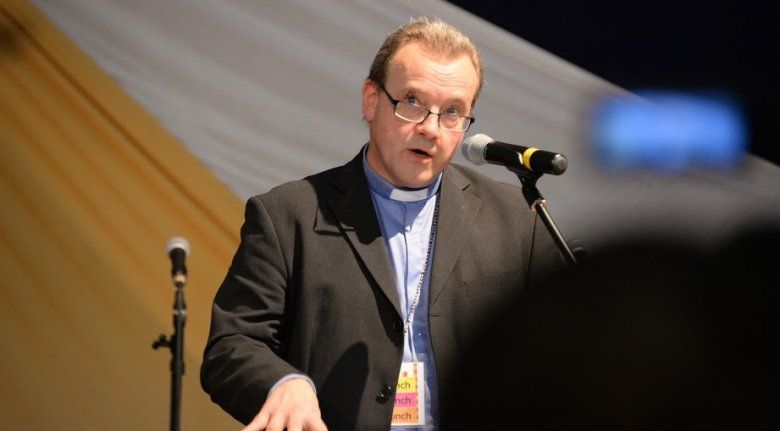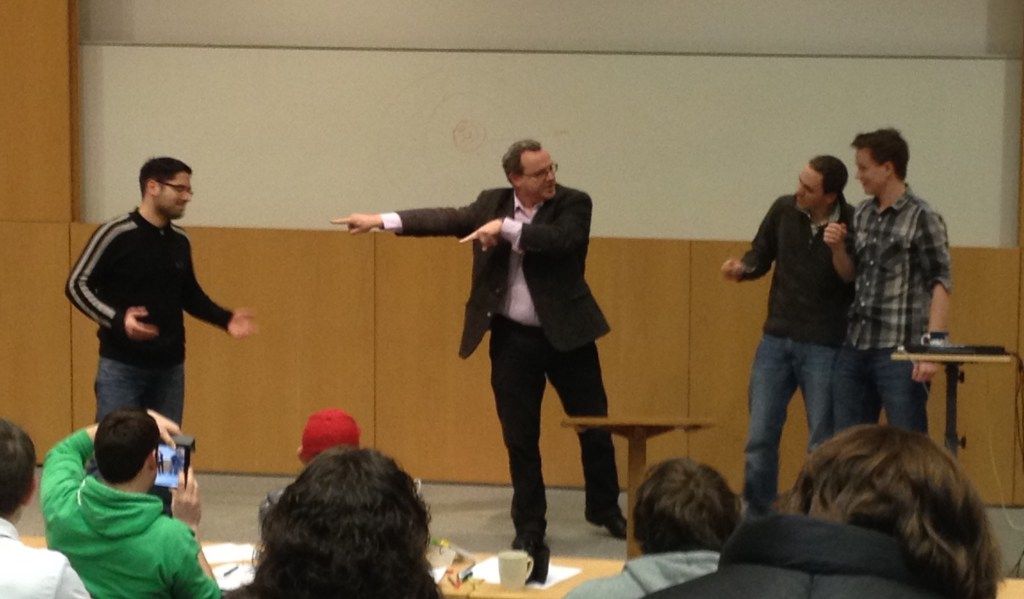Review of The Goldilocks Zone (Collected Writings of Mike Ovey)

If you ever find yourself standing on Platform 14 at Manchester Piccadilly station and you look down to the streets below, you’ll see the old frontage of Mayfield Station, where the locomotives used to run from in days gone by. And you’ll likely notice that on the ageing brickwork three words have been affixed in bold lettering, made up of eye-catching lightbulbs and powder-coated steel: ‘Everything is Connected’.

It’s actually an art installation by British artist Peter Liversidge, celebrating the regeneration under way in the city’s Mayfield area, but it would also make a fitting sub-title to The Goldilocks Zone (TGZ), a collection of essays, articles and addresses by the late Mike Ovey and recently published by IVP.
Up until Mike’s untimely death in January 2017, he was the Principal of Oak Hill College, one of the UK’s foremost evangelical theological seminaries. And though there’s much that could and has been said about Mike’s gifts and legacy, he was a master of showing the significance of theology: of drawing connections between the realities of life and theological thinking, and demonstrating how all theology was inevitably intertwined, not least with our doctrine of God.
A Banquet to Return To
As you’d imagine, like most ‘collected works’, this isn’t a tome to blitz through, as you might do with a topical book. Instead TGZ is best treated as a banquet to which one can repeatedly return, letting Mike’s approach, method and worked-through thinking slowly diffuse into one’s mind, as we meander through the various articles and essays. Indeed, the subject matter is, in typical Ovey-fashion, hugely varied. That in itself underlines how remarkable Mike was as a thinker, able to turn his mind to any particular issue – be it from the Bible, the Church, or the World – before then showing how the issue in question was actually relevant to all three areas. Indeed, everything is connected.

Editor Chris Green has collected these writings into four main sections. We begin with fifteen of Mike’s short ‘Off the Record’ columns for online reformed journal Themelios. These were highly-anticipated with each edition, providing bitesize yet incisive reflections on contemporary issues. Whether it’s his proposal that – following the psalmist – we might better serve our culture by using the language of theft to describe sin, or his reflections on the way we can covertly ‘gag’ God as we introduce our own readings of a text, each piece is stimulating, self-aware and actually ends up raising more piercing questions than it gives answers.
In the second section we get seven of Mike’s contributions to the Cambridge Papers, a series birthed from a gathering of Christian academics – convened by Michael Schluter – which began meeting regularly in Cambridge in 1988. The group would take it in turns to consider a contemporary issue and address it in light of God’s revelation. The aim was, as Mike put it, to “think Christianly”. These are slightly longer pieces and include Mike’s perceptive and timely comments on the rhetoric of victimhood; a consideration of the biblical category of idolatry as a tool to understand religion; and a gentle but deft exploration of the presupposition that God could never conceivably establish asymmetry between the sexes.
Deepwater Diving Brings Home the Pearls
In section three, Green selects two of Mike’s longer theses, both concerning the doctrine of the atonement and both published previously in different publications. Of course, Mike also co-wrote the renowned Pierced for our Transgressions, a colossal defence of Jesus’ death being both punitive and substitionary, which has become a ‘go-to’ resource on the subject. And yet even with all that is said in that tome, these two essays are a welcome contribution to the defence and proclamation of an orthodox understanding of the atonement. In both the reader is given a lesson in deep-sea diving – very deep! – and you find yourself being introduced to characters who may have otherwise been unfamiliar. For example, the first piece sees Mike riffing on the work of twentieth-century historian of ideas, Isaiah Berlin, whilst the second is a nuanced engagement with Gustav Aulen, a regular name-drop for many an undergraduate theologian, but perhaps not always with the most nuance. And yet in both, despite the depth, you still return to the surface with many pearls that bring value to the challenges of being ministers of the gospel in 2018, such as an exploration of the tendency within some denominations to speak of the validity of different ‘gospels’ for different people, or the question of how we might speak of God’s victory alongside or in contrast to God’s justice.

The final section is made up of three addresses/lectures Mike gave at the Global Anglican Future Conferences (GAFCON), an international assembly of Anglican leaders that first took place in Jerusalem in 2008, before Nairobi in 2013 (and with a third conference scheduled again for Jerusalem this coming June, 2018). Two of the essays (2008) see Mike essentially unpack some of the theological convictions undergirding his approach to theological education. These are a helpful ‘under-the-bonnet’ introduction to what Mike understood as a gospel-shaped approach to the Scriptures, in a sense giving his methodology behind Oak Hill. But it is the final essay that is the stand-out, entitled The Grace of God Or the World of The West. Those who had the privilege of witnessing this delivered in person describe the electric atmosphere that prevailed amidst All Saints Cathedral in Nairobi as Mike spoke. He essentially argues that in much of Western Christianity there abounds a ‘cheap grace’, to use Bonhoeffer’s phrase, being a message that is lacking in biblical notions of repentance and that is more in tune with what the prevailing culture demands and expects. There is no doubting that this is a tour de force, with numerous diverse cultural reference points enriching a message that is both blistering in its critique but also heartfelt in its personal tone.
By the way, if you hadn’t guessed, the fairy-tale inspired title of this collection is a reference to Mike’s conviction, expressed in one of the opening articles, that just like Goldilocks’ porridge, theology needed to be ‘just right’. He’d often explain this by speaking of the humble confidence that Christians should have when it comes to theology: confidence because God has chosen to reveal himself in his Word, but humble because we are entirely reliant on that which he has revealed to us. Reading TGZ highlights that this isn’t just nice presuppositional theory, but this is very much the posture that Mike thought and wrote with, as one to whom God had graciously chosen to reveal himself, by his Spirit, through his Word.
The Man Behind the Pen

In addition to these four main sections, TGZ is also book-ended with four pieces written by those who knew, loved, and worked in partnership with Mike. Opening the batting, Mark Thompson, Principal of Sydney’s Moore College, gives a broad sweep of the key themes of Mike’s theological writing and teaching. It acts as a helpful guide to what follows, flagging up some of the central themes to look out for and I imagine is particularly useful if you’ve not been on the receiving end of Mike’s teaching. Chris Green, former Vice-Principal of Oak Hill and TGZ editor, then offers a brief album of literary photographs, each one describing a typical scene from across Mike’s life, giving you a sense of some of the key influences and arenas in which he operated and lived. To finish the book off, Peter Jensen’s sermon from Mike’s Thanksgiving Service last February reflects on the man’s life, and this is followed by a stirring call to prize theological education from Mike’s most recent Vice-Principal at OH, Dan Strange. Together these four paint a picture of the man behind the words. Of course, you often get glimpses of an author’s character or personality in their work, and so it is the case that Mike’s self-awareness, pastoral heart, and humility regularly bubble to the surface of these page. And yet given character was so much a part of Mike’s vision for Christian formation and leadership, these biographical pieces are a welcome and important addition, demonstrating this is something he modelled himself.
It should go without saying that this book will be especially treasured by those who knew Mike well, or those who were on the receiving end of his ministry, especially those who went through Oak Hill whilst Mike was on Faculty. There’s enormous emotional impact in hearing Mike’s voice again, albeit through his words. I was moved to fondly recall both Mike’s person and manner, as well as the theological ideas which Mike introduced so many to.
But whether or not one’s circumstances meant one had the privilege to receive Mike’s teaching, there’s no question that The Goldilocks Zone is worth its weight in gold as a companion for living and thinking as Christians – and those in Christian ministry – in this late-modern period. Personally, I’ve no doubt that this work will be referenced and drawn upon by vast numbers in these next few generations. Before attending Oak Hill I was certainly aware of Mike’s reputation as a leading figure in British evangelicalism, but I had little sense of quite why that was. Sometimes those who identify as ‘conservative evangelical’ are portrayed as haughty, indelicate and unable to engage beyond pat answers, and of course such stereotypes rarely have no substance to them, even if the substance might be a lack of self-awareness of the portrayal. And yet Mike wasn’t a ‘leading figure’ because his voice was loudest or most shrill, or because he’d hoarded power. This work is an important demonstration of why he had the reputation that he did, capturing his warmth, meekness, and self-awareness (not to mention a brain-the-size-of-a-planet), and thus explaining the influence he holds. Everything is connected.
As tributes have been made over the past year, the comment has been frequently made that Mike’s students were his books. In other words, they were where Mike invested his time and energy. But it may just be the case, as God’s providence would have it, that through this one book a whole new generation of Ovey students will be shaped. And though this means, they – like him- might be better watchers of the world, students of the Scriptures, and lovers of Christ.
You can pick up a copy of The Goldilocks Zone from the publisher here.
—
Disclaimer: I received a free copy of this book from the publisher, but I hope this is still a fair review.